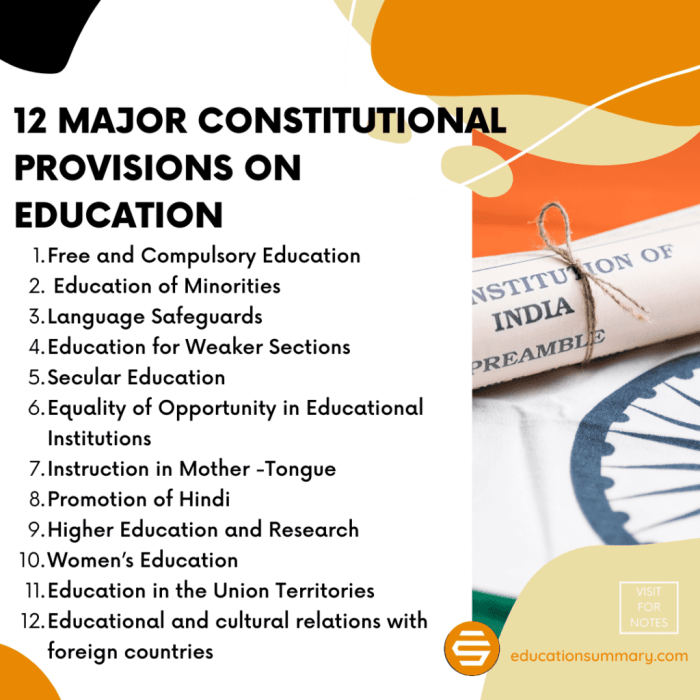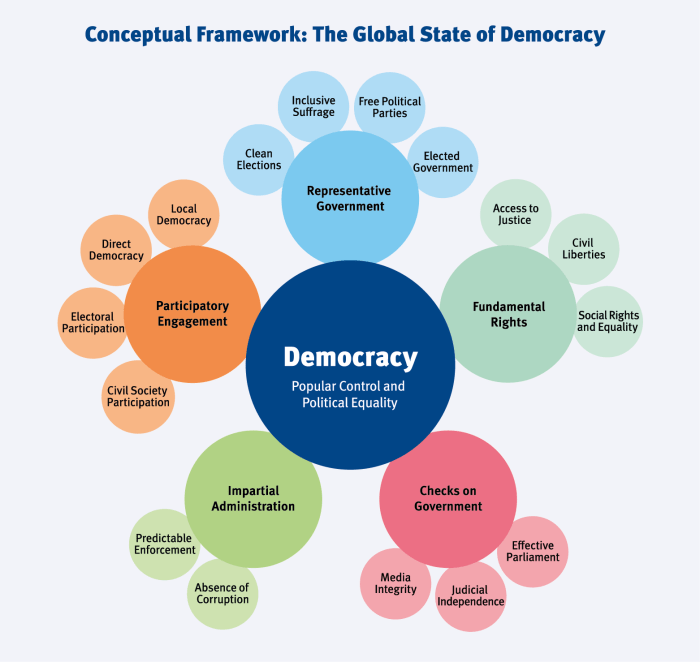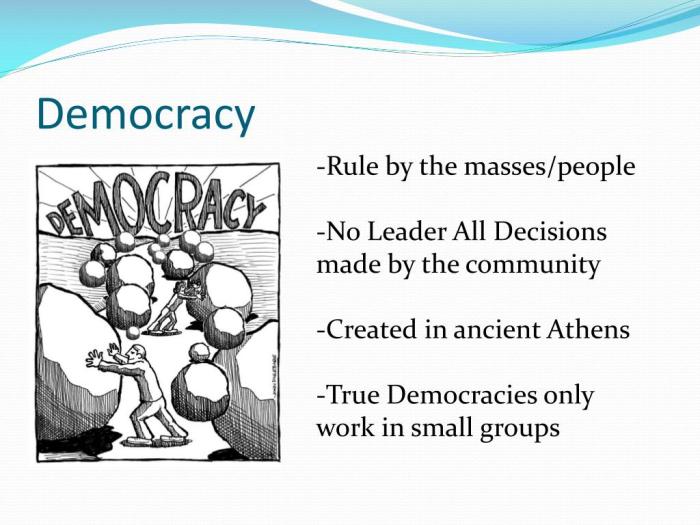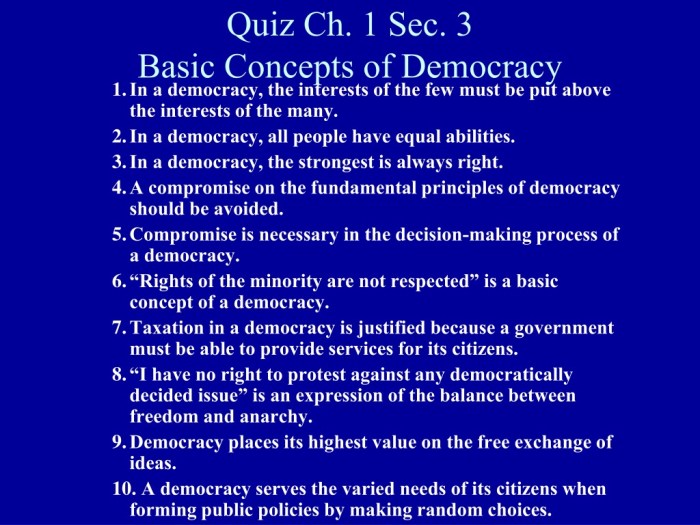Topic 1.1 ideals of democracy – In the realm of governance, ideals of democracy reign supreme, embodying the aspirations of a just and equitable society. At the heart of these ideals lie liberty, equality, and participation, principles that have shaped the course of history and continue to inspire nations worldwide.
From the ancient Greek city-states to modern constitutional democracies, the pursuit of democratic ideals has been a driving force behind social and political transformation. These ideals serve as a beacon of hope, reminding us of the power of collective action and the inherent dignity of every individual.
Core Ideals and Values of Democracy

At the heart of democracy lies a constellation of core ideals and values that have shaped its evolution and continue to guide its practice. These fundamental principles, such as liberty, equality, and participation, form the bedrock upon which democratic societies are built, ensuring a just and equitable society for all.
Liberty, Topic 1.1 ideals of democracy
Liberty, or freedom, is a cornerstone of democracy. It encompasses the right to express oneself freely, pursue one’s beliefs and aspirations, and live without undue interference from the state or other individuals. Historical examples abound, from the Magna Carta in 1215, which established the principle of due process, to the American Declaration of Independence in 1776, which proclaimed the unalienable rights of life, liberty, and the pursuit of happiness.
Equality
Equality is another fundamental value in democracy. It implies that all citizens are entitled to equal rights, opportunities, and treatment before the law, regardless of their race, gender, religion, or social status. The pursuit of equality has been a driving force in democratic movements throughout history, from the abolition of slavery to the fight for women’s suffrage.
Participation
Participation is vital for a healthy democracy. It empowers citizens to have a voice in decisions that affect their lives. This includes the right to vote, run for office, and engage in civic activities. Participatory democracy ensures that the government is responsive to the needs and aspirations of the people it serves.
Types of Democratic Systems

Democracy, a governance system that prioritizes citizen participation, takes various forms. Each model possesses unique advantages and disadvantages, shaping the political landscape of nations worldwide.
Direct Democracy
In direct democracy, citizens directly participate in decision-making, exercising their power through referendums, initiatives, and town hall meetings. This system fosters a sense of civic engagement and allows citizens to have a tangible impact on their governance. However, it can be challenging to implement in large-scale societies, where direct participation becomes impractical.
The ideals of democracy, such as freedom of speech and the rule of law, were a major point of contention between the superpowers during the Cold War. As the two sides faced off, each claimed to be the true defender of democracy, while accusing the other of being a totalitarian dictatorship.
The Cold War was a complex and multifaceted conflict, and the battle for hearts and minds was just one aspect of it. However, the ideals of democracy were a powerful weapon in the arsenal of both sides, and they played a major role in shaping the outcome of the Cold War.
Read more about the Cold War superpowers face off here .
Representative Democracy
Representative democracy, the most prevalent model, involves citizens electing representatives to make decisions on their behalf. This system offers the advantage of specialized expertise and the ability to handle complex issues efficiently. However, it can lead to concerns about accountability and the potential for representatives to prioritize personal interests over the collective will.
Constitutional Democracy
Constitutional democracy establishes a framework of laws and principles that govern the exercise of power. This system aims to protect individual rights and liberties while limiting the authority of the government. It balances democratic principles with the rule of law, ensuring that decisions are made within a predetermined constitutional framework.
Examples of countries implementing different types of democracy include Switzerland (direct democracy), the United States (representative democracy), and Canada (constitutional democracy).
Democratic Institutions and Structures

Democratic institutions are the backbone of any democratic system, providing the framework for the functioning of a democratic government and safeguarding the rights of citizens. These institutions include legislatures, judiciaries, and electoral systems, each playing a crucial role in ensuring the effective operation of a democracy.
Legislatures are responsible for creating and passing laws, representing the will of the people and ensuring that the government remains accountable to its citizens. Judiciaries, on the other hand, interpret and enforce the laws, ensuring fairness and impartiality in the administration of justice.
Electoral systems provide a mechanism for citizens to participate in the democratic process by choosing their representatives and holding them accountable.
Best Practices of Democratic Institutions
Effective democratic institutions adhere to certain best practices, such as:
- Transparency:Institutions should operate openly and transparently, allowing for public scrutiny and accountability.
- Independence:Institutions should be independent from political interference, ensuring impartial decision-making.
- Accountability:Institutions should be held accountable to the people through regular elections or other mechanisms.
- Inclusivity:Institutions should be accessible and representative of all citizens, regardless of background or affiliation.
Challenges Faced by Democratic Institutions
Despite their importance, democratic institutions can face various challenges, including:
- Political polarization:Intense partisan divisions can hinder the ability of institutions to function effectively.
- Corruption:Corruption can undermine the integrity and credibility of institutions, eroding public trust.
- External interference:Foreign powers may attempt to influence or manipulate democratic institutions, threatening their independence.
- Technological advancements:New technologies can both enhance and challenge democratic processes, requiring institutions to adapt.
Citizen Participation and Engagement

Citizen participation is vital in a democracy, ensuring that the government is responsive to the needs and aspirations of the people. It allows citizens to have a say in decision-making, hold their elected representatives accountable, and shape the direction of their society.Different
forms of civic engagement exist, including voting, activism, and community involvement. Voting is a fundamental right that allows citizens to directly choose their representatives and influence government policies. Activism involves organized efforts to bring about social or political change, while community involvement refers to activities that aim to improve local neighborhoods and communities.Strategies
to promote citizen participation include enhancing civic education, making voting more accessible, and encouraging community-based organizations. By fostering a culture of active citizenship, democracies can strengthen their legitimacy and responsiveness, ensuring that the voices of all citizens are heard and considered.
Challenges to Democracy

Democracy, as an ideal, faces several challenges that can undermine its core values and institutions. These challenges threaten the stability and legitimacy of democratic systems, posing significant obstacles to their effective functioning.
Authoritarianism
Authoritarianism is a significant threat to democracy. It involves the concentration of power in the hands of a single person or a small group, suppressing political opposition and limiting individual freedoms. Authoritarian regimes often erode democratic institutions, such as free and fair elections, an independent judiciary, and a free press.
Examples of countries that have faced democratic setbacks due to authoritarianism include Russia, Turkey, and Hungary.
Corruption
Corruption is another major challenge to democracy. It involves the misuse of public power for private gain. Corruption undermines the integrity of democratic institutions and erodes public trust. It can lead to unequal distribution of resources, unfair competition, and a lack of accountability.
Countries that have struggled with corruption include Mexico, Brazil, and India.
Inequality
Inequality, particularly in terms of wealth and income distribution, can pose a threat to democracy. When there is a significant gap between the rich and the poor, it can lead to social unrest, political polarization, and a lack of faith in democratic institutions.
Countries that have faced challenges due to inequality include the United States, the United Kingdom, and South Africa.
The Future of Democracy: Topic 1.1 Ideals Of Democracy

In the 21st century, democracy faces unprecedented challenges and opportunities. As technology advances and globalization intensifies, we must adapt and innovate to preserve and strengthen democratic principles.
One emerging trend is the rise of digital democracy. Social media and online platforms offer new avenues for citizen participation and engagement. However, they also pose challenges, such as the spread of misinformation and the erosion of privacy.
Innovative Approaches
To address these challenges, we need innovative approaches to strengthening democracy. These include:
- Promoting digital literacy and critical thinking skills to combat misinformation.
- Developing new mechanisms for citizen engagement that harness the power of technology.
- Protecting privacy and data rights to ensure the integrity of democratic processes.
Vision for the Future
The future of democracy depends on our ability to adapt and innovate. By embracing new technologies and addressing the challenges they present, we can create a more inclusive, participatory, and resilient democratic system.
This vision includes:
- Empowered citizens who are actively engaged in shaping their society.
- Strong democratic institutions that are transparent, accountable, and responsive to the needs of the people.
- A global community that collaborates to promote and protect democratic values.
FAQ Overview
What is the most fundamental principle of democracy?
The most fundamental principle of democracy is the sovereignty of the people, meaning that the ultimate authority to govern lies with the citizens.
How does liberty contribute to a democratic society?
Liberty empowers individuals to make choices and live their lives without undue interference from the government, fostering a climate of creativity and innovation.
What is the role of equality in a democracy?
Equality ensures that all citizens have equal rights and opportunities, regardless of their background or circumstances, creating a just and fair society.
Why is citizen participation essential for democracy?
Citizen participation allows individuals to have a voice in the decision-making process, ensuring that the government is responsive to the needs of the people.